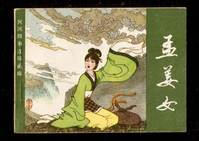Difference between revisions of "Meng Jiangnu"
imported>Superleila m (Created page with ''''Meng Jiangnu''''s story is the most famous and widespread folk tale about the Great Wall. It talks about the separation of a loving couple and their heart-breakingly tragi...') |
imported>Superleila |
||
| Line 1: | Line 1: | ||
'''Meng Jiangnu''''s story is the most famous and widespread folk tale about the [[Great Wall]]. It talks about the separation of a loving couple and their heart-breakingly tragic ending as a result of building the Wall. | '''Meng Jiangnu''''s story is the most famous and widespread folk tale about the [[Great Wall]]. It talks about the separation of a loving couple and their heart-breakingly tragic ending as a result of building the Wall. | ||
| + | |||
| + | [[File:Meng Jiangnu.jpg|thumb|Meng Jiangnu]] | ||
The story happened during the [[Qin Dynasty]] (221BC-206BC). It tells of how Meng Jiangnu's bitter weeping made a section of the Great Wall collapse. Meng Jiangnu's husband [[Fan Qiliang]] was caught by federal officials and sent to build the Great Wall. Meng Jiangnu heard nothing from him after his departure, so she set out to look for him. | The story happened during the [[Qin Dynasty]] (221BC-206BC). It tells of how Meng Jiangnu's bitter weeping made a section of the Great Wall collapse. Meng Jiangnu's husband [[Fan Qiliang]] was caught by federal officials and sent to build the Great Wall. Meng Jiangnu heard nothing from him after his departure, so she set out to look for him. | ||
Latest revision as of 00:54, 20 January 2010
Meng Jiangnu's story is the most famous and widespread folk tale about the Great Wall. It talks about the separation of a loving couple and their heart-breakingly tragic ending as a result of building the Wall.
The story happened during the Qin Dynasty (221BC-206BC). It tells of how Meng Jiangnu's bitter weeping made a section of the Great Wall collapse. Meng Jiangnu's husband Fan Qiliang was caught by federal officials and sent to build the Great Wall. Meng Jiangnu heard nothing from him after his departure, so she set out to look for him.
Unfortunately, by the time she reached the Great Wall, she discovered that her husband had already died. Hearing the bad news, she cried her heart out. Her howling caused the collapse of a part of the Great Wall. This story indicates that the Great Wall was the result of the hard labor of tens of thousands of Chinese commoners.
The story has spread through many regions of China for more than 2,500 years. Meng's tragedy was related to the atrocious Emperor Qin Shihuang and the Great Wall. The section of the Great Wall that was toppled by Meng and the sea where she committed suicide are in today's Zibo City, Shandong Province.
The image of Meng represents the kindness of ancient women and the torture brought on the people by war. The story shows the dislike ancient people had towards war. It has been passed down from generation to generation in Bo Shan.
